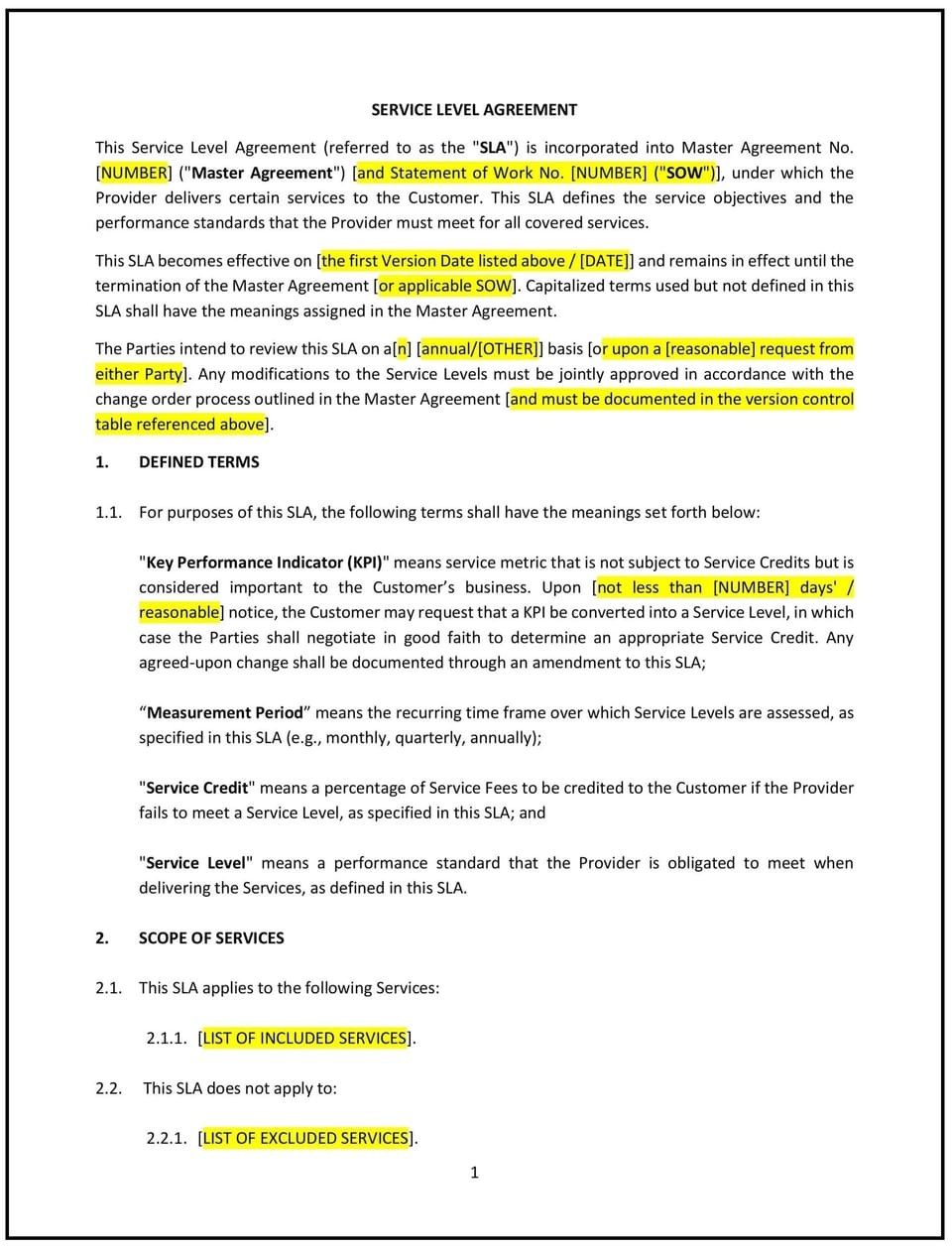Service Level Agreement (SLA) (Texas): Free template

Service Level Agreement (SLA) (Texas)
A Service Level Agreement (SLA) in Texas is a legally binding contract that sets expectations for service performance, availability, and accountability between a service provider and a client. This agreement helps businesses ensure that service providers meet clearly defined performance standards, reducing the risk of disputes and service failures. SLAs are widely used in industries such as IT services, cloud computing, consulting, maintenance, and professional services, where reliability and quality are critical.
Texas contract law governs SLAs, but businesses in regulated industries such as healthcare, finance, and telecommunications must also comply with federal and industry-specific requirements. A well-structured SLA provides legal protection, promotes accountability, and gives business owners confidence in their service agreements.
Tips for drafting and maintaining a Service Level Agreement in Texas
- Clearly define the scope of services, specifying exactly what the provider is responsible for and what is outside the agreement to avoid misunderstandings.
- Establish measurable performance standards, such as system uptime percentages, response times, and resolution deadlines, so expectations are clear and enforceable.
- Outline client responsibilities, including any data, resources, or cooperation required for the provider to meet performance expectations.
- Specify remedies for underperformance, such as service credits, refunds, or contract termination rights. Texas law allows businesses to negotiate these terms freely.
- Include a dispute resolution clause, specifying whether conflicts will be resolved through Texas courts, arbitration, or mediation. Arbitration is often preferred for cost-effective resolution.
- Address confidentiality and data security obligations, particularly if the provider handles sensitive business or customer information. Some services may also be subject to federal data protection laws.
- Review and update the SLA regularly to keep it aligned with business needs, evolving industry standards, and any regulatory changes.
Frequently asked questions (FAQs)
Q: What should Texas businesses include in a Service Level Agreement?
A: An SLA should cover service scope, performance standards, remedies for non-compliance, client responsibilities, dispute resolution procedures, and termination rights.
Q: How does a Service Level Agreement benefit small businesses in Texas?
A: It ensures that service providers meet agreed-upon expectations, protects businesses from poor service, and provides clear remedies if performance standards are not met.
Q: Are service credits legally enforceable in Texas SLAs?
A: Yes, service credits (discounts or refunds for service failures) are enforceable if explicitly stated in the contract.
Q: What happens if a service provider fails to meet SLA requirements in Texas?
A: Depending on the agreement, the client may be entitled to service credits, refunds, or contract termination. Legal action may be taken if the breach is significant.
Q: How should Texas businesses handle SLA disputes?
A: The SLA should specify how disputes will be handled, including options for mediation, arbitration, or litigation in Texas courts.
Q: Are verbal SLAs enforceable in Texas?
A: While verbal agreements can sometimes be enforced, a written SLA provides stronger legal protection and ensures both parties fully understand their obligations.
Q: Can an SLA be modified after signing in Texas?
A: Yes, but modifications require mutual agreement and should be documented in writing to prevent future disputes.
This article contains general legal information and does not contain legal advice. Cobrief is not a law firm or a substitute for an attorney or law firm. The law is complex and changes often. For legal advice, please ask a lawyer.


